Who is the blogger?
SNAM Video Trailer Collection Alphabetical Listing
Video Trailers from picks on TVOntario's Saturday Night at the Movies
Georgy Girl (1966)
 Before there was an “Ugly Betty”, there was “Georgy Girl” (1966). The film lights down in London town during those mad 1960s with the crazy new sounds coming out of bands like “The Seekers” and the even crazier new hairdos and mini skirts. We see Georgy girl (Lynn Redgrave) awkwardly sporting one of the new “dos” as the opening credits roll over top of the chart topping
Before there was an “Ugly Betty”, there was “Georgy Girl” (1966). The film lights down in London town during those mad 1960s with the crazy new sounds coming out of bands like “The Seekers” and the even crazier new hairdos and mini skirts. We see Georgy girl (Lynn Redgrave) awkwardly sporting one of the new “dos” as the opening credits roll over top of the chart topping 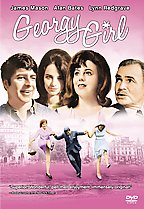 number by the Australian band. (I was surprised to learn that they weren’t a part of the British invasion.) The film is a lot like the title song in that it is a lighthearted romp with surprisingly serious undertones for those who are really listening.
number by the Australian band. (I was surprised to learn that they weren’t a part of the British invasion.) The film is a lot like the title song in that it is a lighthearted romp with surprisingly serious undertones for those who are really listening.
The story line is a bit mixed up, much like Georgy herself. Georgy’s beautiful and free-spirited roommate, Meredith, leaves behind a boyfried and a baby as she gets on with her life after an ever so brief encounter with her own non-maternal nature. Georgy tries to pick up the pieces. After all, there is an adorable, helpless child involved. The make-shift domestic arrangements with Jos, the baby’s father, soon fall apart. A cast-off boyfriend doesn’t really fit any 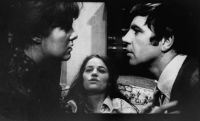 better than the ridiculous coiffure that Georgy tries on in the film’s introduction. In true improvisational style that fits the times and Georgy’s quirky personality, she tries on a completely different set of circumstances by accepting her family’s employer as stand-in dad. James Leamington (played by James Mason) is supposedly Georgy’s better in social standing - although one wonders if he isn’t actually her “worser” after he offers her an albeit “very proper” and attractive contractual arrangement for Georgy to be his mistress. Georgy passes up the offer. She’d like to think she can do better. She changes her mind (like a girl changes clothes) when the offer firms up a bit more and becomes a proposal of marriage after Leamington’s wife conveniently takes herself out of the way by dying.
better than the ridiculous coiffure that Georgy tries on in the film’s introduction. In true improvisational style that fits the times and Georgy’s quirky personality, she tries on a completely different set of circumstances by accepting her family’s employer as stand-in dad. James Leamington (played by James Mason) is supposedly Georgy’s better in social standing - although one wonders if he isn’t actually her “worser” after he offers her an albeit “very proper” and attractive contractual arrangement for Georgy to be his mistress. Georgy passes up the offer. She’d like to think she can do better. She changes her mind (like a girl changes clothes) when the offer firms up a bit more and becomes a proposal of marriage after Leamington’s wife conveniently takes herself out of the way by dying.
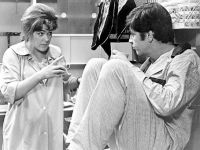 In the end, it is a marriage of convenience that Georgy chooses as her best fit in the era of the sexual revolution. It is perhaps the best option afforded to someone like Georgy “who just missed being beautiful”. One wonders how well this arrangement is going to work out over time, as we watch the closing scene where the new bride repeatedly caresses her adopted infant. She seems oblivious to the groom sitting next to her in the get away car. It may well end up as just another failed experiment to be washed away down the drain along with the hair pins and mascara of Georgy’s “new look” in the opening scene.
In the end, it is a marriage of convenience that Georgy chooses as her best fit in the era of the sexual revolution. It is perhaps the best option afforded to someone like Georgy “who just missed being beautiful”. One wonders how well this arrangement is going to work out over time, as we watch the closing scene where the new bride repeatedly caresses her adopted infant. She seems oblivious to the groom sitting next to her in the get away car. It may well end up as just another failed experiment to be washed away down the drain along with the hair pins and mascara of Georgy’s “new look” in the opening scene.
Georgy’s pick of the best offer out of a limited range of options appears to be missing something: unconditional commitment and acceptance of people for who they really are. It’s what Georgy really wants; it’s what all of us want in the end –free love.
Don’t miss the SNAM Interviews on the subject of “Beauty -and Other Myths”. The Interviews deal extensively with another movie with a parallel theme shown in conjunction with “Georgy Girl” The second feature was “Dogfight”.
>>Real Life: Michelle participated in “The Biggest Loser” contest in order to lose weight. She found unexpected healing that led to a more permanent change in her life.
>>More to see: Looking for more out of life?
See the TVO video trailer for "Georgy Girl" (1966)
I Confess (1953)
 “I Confess” (1953) with Montgomery Clift, Anne Baxter, and Karl Malden makes for a rather melodramatic situation where the real murderer uses the silence of the confessional as the perfect cover-up for his crime. Alfred Hitchcock’s direction on site in Quebec City gives this film a bit of a different perspective. Once you realize that the setting is supposed to be Quebec City during the 1950’s in the pre-Vatican II Duplessis era, it all starts to make a little more sense – the film, that is, not the murder mystery plot. The murder, cover-up, romance, blackmail and dénouement are all very predictable. What else can we expect when two excruciatingly
“I Confess” (1953) with Montgomery Clift, Anne Baxter, and Karl Malden makes for a rather melodramatic situation where the real murderer uses the silence of the confessional as the perfect cover-up for his crime. Alfred Hitchcock’s direction on site in Quebec City gives this film a bit of a different perspective. Once you realize that the setting is supposed to be Quebec City during the 1950’s in the pre-Vatican II Duplessis era, it all starts to make a little more sense – the film, that is, not the murder mystery plot. The murder, cover-up, romance, blackmail and dénouement are all very predictable. What else can we expect when two excruciatingly 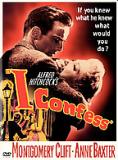 beautiful people such as Anne Baxter and Montgomery Clift are caught up in a thoroughly impossible situation? It is all completely incomprehensible and implausible in today’s world until you remember that this is supposed to be Quebec in the 1950’s. The prominent landmarks and buildings seen in the film are still there today. (Our family visits quite regularly.) The social and religious landscapes that make this film believable are not. C’est quoi encore le dicton en anglais? “Much Ado About Nothing”?
beautiful people such as Anne Baxter and Montgomery Clift are caught up in a thoroughly impossible situation? It is all completely incomprehensible and implausible in today’s world until you remember that this is supposed to be Quebec in the 1950’s. The prominent landmarks and buildings seen in the film are still there today. (Our family visits quite regularly.) The social and religious landscapes that make this film believable are not. C’est quoi encore le dicton en anglais? “Much Ado About Nothing”?
>>More to see: Looking for more out of life?
See the film trailer for "I Confess" (1953).
In and Out (1997)
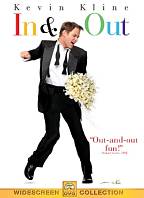 “In and Out” (1997) starring Kevin Kline, Tom Selleck and Joan Cusack is all about the influence of Hollywood on the lives of everyday people living in ordinary places. But isn’t it about a gay high school teacher coming out of the closet? But I thought it was about an unassuming English teacher “being outed” by his former pupil who happened to make a chance remark about his former teacher’s sexual orientation while receiving an Academy
“In and Out” (1997) starring Kevin Kline, Tom Selleck and Joan Cusack is all about the influence of Hollywood on the lives of everyday people living in ordinary places. But isn’t it about a gay high school teacher coming out of the closet? But I thought it was about an unassuming English teacher “being outed” by his former pupil who happened to make a chance remark about his former teacher’s sexual orientation while receiving an Academy 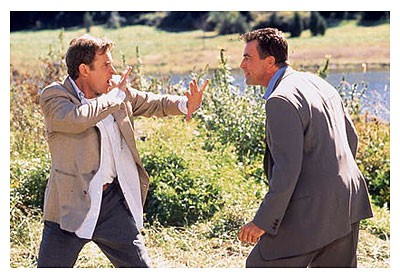 Award. It is all rather confusing. Some people, like Tom Selleck’s character, bigwig reporter Peter Malloy, seem to have perfect clarity about these things. But as for Mr. Howard Brackett himself (Kevin Kline), his fiancée (Joan Cusack), his parents, his friends and pretty much the rest of the world, it all comes as a big surprise.
Award. It is all rather confusing. Some people, like Tom Selleck’s character, bigwig reporter Peter Malloy, seem to have perfect clarity about these things. But as for Mr. Howard Brackett himself (Kevin Kline), his fiancée (Joan Cusack), his parents, his friends and pretty much the rest of the world, it all comes as a big surprise.
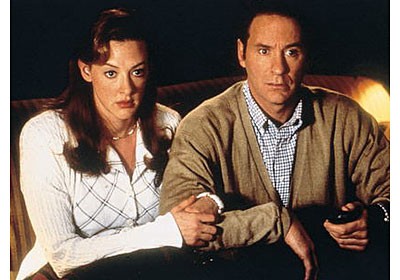 Naturally enough, neither Mr. Brackett nor his fiancée of quite some time were at all suspicious as they carried on with their extraordinarily commonplace lives. And quite naturally, everything and everyone is thrown into a tizzy once the big “revelation” has been announced on national television. From there on in, everything gets re-examined, re-decided and recast simply on the say-so of the newly minted Hollywood star (played by Matt Dillon). The aftershock comes with quite hilarious results,
Naturally enough, neither Mr. Brackett nor his fiancée of quite some time were at all suspicious as they carried on with their extraordinarily commonplace lives. And quite naturally, everything and everyone is thrown into a tizzy once the big “revelation” has been announced on national television. From there on in, everything gets re-examined, re-decided and recast simply on the say-so of the newly minted Hollywood star (played by Matt Dillon). The aftershock comes with quite hilarious results, 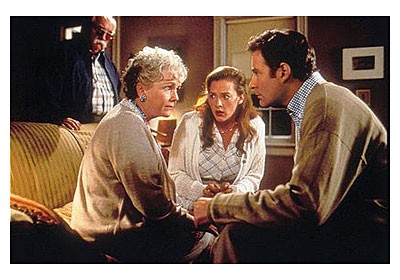 naturally enough. But naturally I wonder who has the bigger problem – Howard Brackett with his questions about his sexual orientation or the rest of us who appear to be so disposed as to believe anything we hear (as long as it is salacious and announced on national television). Fortunately for all concerned, “In and Out” is a comedy and the explorations of the vagaries of human nature remain lighthearted and are often treated in a quite funny manner.
naturally enough. But naturally I wonder who has the bigger problem – Howard Brackett with his questions about his sexual orientation or the rest of us who appear to be so disposed as to believe anything we hear (as long as it is salacious and announced on national television). Fortunately for all concerned, “In and Out” is a comedy and the explorations of the vagaries of human nature remain lighthearted and are often treated in a quite funny manner.
>> Real Life Story: DJ was a young man who was confused about a lot of things in life. Eventually he banged into some hard realities that led to deep life change.
>>More to see: Looking for more out of life?
Don't miss the entire dance sequence in Howard's "Real Men Don't Dance" routine. Catch the trailer for "In and Out" (1997).
It Happened One Night *1934) Video Trailer
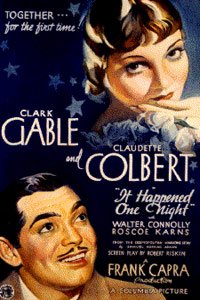 Claudette Colbert and Clark Gable define “Capraesque” in this madcap Depression era comedy that marries glamour and glitz to populist sentiment. Tag along for a wild ride with this TVO Saturday Night at the Movies special on Frank Capra’s classic Hollywood film .
Claudette Colbert and Clark Gable define “Capraesque” in this madcap Depression era comedy that marries glamour and glitz to populist sentiment. Tag along for a wild ride with this TVO Saturday Night at the Movies special on Frank Capra’s classic Hollywood film .
See the video preview from TVO
The Good Old Bad Old Days
I sometimes wonder if my grandmother would have gone to see a film like “It Happened One Night” at the movie theatre. I look at black and white photos with the funny old hats and the rattletrap black Model Ts and chuckle. . .
<< Back to the review of "It Happened One Night" on Midnight Oil
>>On to "Who's Directing Your Life?"
Catch the video trailer of "It Happened One Night"
Related Reading:
- Bible quiz time: Did the original story of the walls of Jericho occur in the book of Exodus (apologies to Paul Newman), Deuteronomy, or Joshua (not the guy with the bad hair in Cecil B. De Mille production)
- The junk in the trunk: How the stuff you forgot to unpack after the honeymoon was over can skuttle even the best of relationships
- “Yes, but will she still respect you in the morning?” Respect in communication as a missing ingredient.
- Director/producer Frank Capra was the originator of the “one man, one film” concept. Whose name gets top billing on your life’s story?
It's a Wonderful Life (1946)
 “It’s a Wonderful Life” is the kind of film everyone loves to see (and see again) no matter what time of year it is. It seems like the more things change, the more a film like this stays the same. It provides a kind of film-watchers’ comfort food as we hurtle at breakneck speed through the ensuing decades of personal, societal, and cinematic evolution. Perhaps some of us are not so sure anymore of why exactly we like this movie, how the tradition of watching it got started or if the film is really all that good in the first place. We know that it’s a
“It’s a Wonderful Life” is the kind of film everyone loves to see (and see again) no matter what time of year it is. It seems like the more things change, the more a film like this stays the same. It provides a kind of film-watchers’ comfort food as we hurtle at breakneck speed through the ensuing decades of personal, societal, and cinematic evolution. Perhaps some of us are not so sure anymore of why exactly we like this movie, how the tradition of watching it got started or if the film is really all that good in the first place. We know that it’s a  part of a well-worn tradition (like eating fruitcake and turkey giblet gravy at Christmas). For that reason, if for no other, we are bound to see it again some time.
part of a well-worn tradition (like eating fruitcake and turkey giblet gravy at Christmas). For that reason, if for no other, we are bound to see it again some time.
There’s just something terribly likeable about that everyman character, George Bailey (played by Jimmy Stewart). It’s not that he’s all that good looking or extremely clever or exceptionally charming or anything else. He’s just supposed to be an ordinary “nice guy”. In this big old mean old world, even nice guys can have some pretty big problems. At a certain point, George’s charmed life comes crashing in upon him and he finds  himself about to jump off a bridge to put an end to it all. George Bailey wonders out loud if his life has really been worth living. A guardian angel (played by Henry Travers) is immediately dispatched from the heavenly realms in order to put things to rights. With the help of the unearthly messenger, George comes to realize that his life has had a tremendous impact, not only on his immediate family members, but on the whole community.
himself about to jump off a bridge to put an end to it all. George Bailey wonders out loud if his life has really been worth living. A guardian angel (played by Henry Travers) is immediately dispatched from the heavenly realms in order to put things to rights. With the help of the unearthly messenger, George comes to realize that his life has had a tremendous impact, not only on his immediate family members, but on the whole community.
 Wholesome is a good word to describe this film. It’s not a type of picture that you would see made today. Maudlin might be another word employed by some detractors of the film who would have little patience for such a cinematic work. But then, such people might not really appreciate how things work and what exactly goes on around the family dinner table each Christmas at our house. There are just certain dishes that Mother makes for every Christmas dinner (like the orange
Wholesome is a good word to describe this film. It’s not a type of picture that you would see made today. Maudlin might be another word employed by some detractors of the film who would have little patience for such a cinematic work. But then, such people might not really appreciate how things work and what exactly goes on around the family dinner table each Christmas at our house. There are just certain dishes that Mother makes for every Christmas dinner (like the orange  jellied salad or the buttered spicy squash). If you come as a guest for the dinner every year, you know that you are going to have to eat those dishes. It does no good to complain. You might as be reconciled with the traditional menu offering and find the virtues of the said salad. You’ll enjoy things a lot more if you do. And after all, what’s so bad about being good? Milk is wholesome too. It can be quite pleasant if you are used to it. And you would probably miss it if you could
jellied salad or the buttered spicy squash). If you come as a guest for the dinner every year, you know that you are going to have to eat those dishes. It does no good to complain. You might as be reconciled with the traditional menu offering and find the virtues of the said salad. You’ll enjoy things a lot more if you do. And after all, what’s so bad about being good? Milk is wholesome too. It can be quite pleasant if you are used to it. And you would probably miss it if you could  no longer have it. That’s kind of how I feel about “It’s a Wonderful Life”.
no longer have it. That’s kind of how I feel about “It’s a Wonderful Life”.
>>Not so Real Life: Sarah takes a chance on striking out in a new direction. Dealing with disappointments
>>More to see: Looking for more out of life?
See the three minute summary of "It's a Wonderful Life" (1946) Also see the scene where George lassos the moon.





